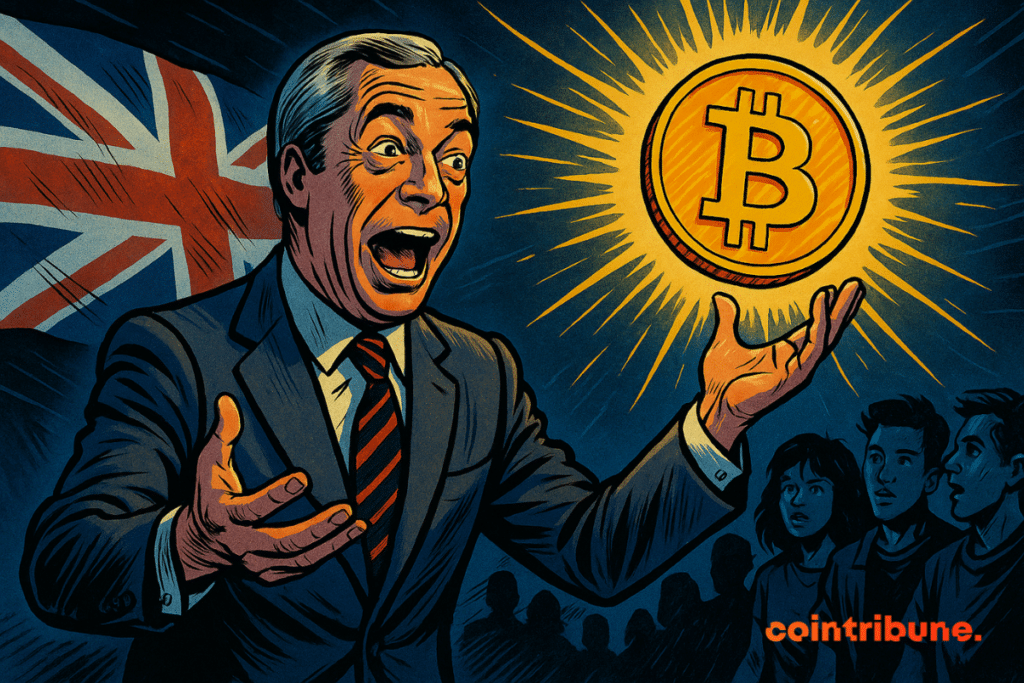Farage’s Bitcoin Gambit: Can Crypto Win Over UK’s Youth?
Nigel Farage makes a play for Gen Z—with Bitcoin as his unlikely Trojan horse. The Brexit firebrand’s pivot to digital assets raises eyebrows and questions in equal measure.
Why target young Brits? Simple: they’re priced out of traditional wealth-building avenues—unless you count avocado toast as an asset class. Bitcoin offers what Farage can’t promise through politics: financial self-sovereignty (and volatility that makes FTSE look comatose).
The unspoken truth? This isn’t about ideology—it’s about recruitment. Every crypto convert becomes a potential foot soldier for populism. Just don’t mention the 40% drops during bear markets.
Closing thought: When establishment figures embrace disruption, check their wallets—not their speeches—for true motives. After all, nothing unites politicians like fresh voter demographics... and fresh transaction fees.

In brief
- Nigel Farage, far-right leader, unveils a bill to integrate crypto into British finance.
- Reform UK now accepts donations in bitcoin and ethereum.
- The bill includes a national bitcoin reserve at the Bank of England.
- 25% of young Britons hold crypto-assets, Farage’s electoral target.
The “Crypto Assets Bill”: a digital revolution announced by the far right
This is not a campaign gimmick, but, structured, provocative. A first in British political history.injects Bitcoin into the very arteries of the State. He wants. Although the idea was rejected by the current government.
He proposes a reduced 10% tax on crypto capital gains. He wants to ban banks from closing accounts deemed too Web3. A two-year regulatory sandbox will serve as a springboard.
The idea? Remove barriers.. And above all, credible. The project is not written on a corner of a table. It sticks to a conviction. “Bitcoin is freedom“, repeats Farage since his banking exclusion. He has not forgotten. He politicizes the attack. And turns his exclusion into a slogan.
No empty speeches: promises that are striking. He assures citizens will pay their taxes in crypto. Some laugh. Others are already downloading their crypto wallet.
Donations in bitcoin: political move or viral strategy?
Farage is not pretending.. Bitcoin, Ethereum, stablecoins, all are welcome. He is not the first. But he is the first to make it an electoral pivot. Not a communication gimmick, a declaration of intent.. That of the tech-loving outsider who speaks to young people.
BTCUSD chart by TradingViewOn the other side, others remain stuck on the key interest rate. He talks wallet, direct donation, decentralized traceability. And that appeals. Not to analysts. To voters, yes.. They talk about it between two stories. No need for posters, tweets do the job.
And Farage goes further. “Crypto is freedom“, he says, jaw clenched. He knows he will not win Westminster with ICOs. But he also knows these symbols hit home. They shake things up. They create noise. And in this campaign saturated with platitudes, noise is already a victory.
Farage candidate: populist icon or digital wildcard?
He’s back. Again. Farage never really tires out. He resurfaces, often when no one wants to listen anymore. But this time, he comes back with lines of code. Not slogans. And he speaks to the forgotten. Those who listen to YouTube more than BBC. Those who were unbanked, forgotten, mocked.
. It’s no longer just a financial Brexit. It’s an ideological fork. He turns frustration into a program. And his crypto vision fits in there. In this national fatigue. This desire for a break. The feeling that everyone is getting rich except the English. The bullet points are not there for decoration. They speak to instinct:
- 1 in 4 young Britons own crypto;
- Crypto taxes would drop from 24% to 10%;
- Bitcoin would enter the Central Bank;
- Crypto donations become legal and direct;
- Banks would lose their power to shut off the tap.
Farage dives into the political void with a techno vision. Not because he believes in it. Because he senses others do. And because he knows how to capture this vague faith called today “electorate”.
In September 2024, the United Kingdom finally clarified the legal status of crypto and NFTs, recognizing them as personal property. A framework, finally. But faced with debts, doubts, disguised devaluations, what is a framework without action worth? And if the real shock absorber tomorrow were a bitcoin reserve?
Maximize your Cointribune experience with our "Read to Earn" program! For every article you read, earn points and access exclusive rewards. Sign up now and start earning benefits.

